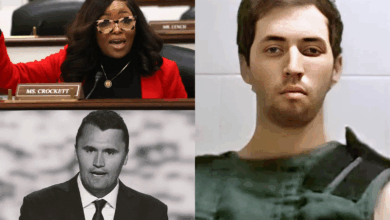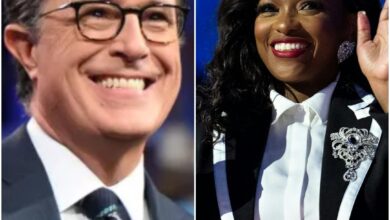RL Billie Eilish’s Speech on Charity and Mark Zuckerberg’s Reaction
At a prestigious award ceremony held in Manhattan on October 29, 2025, 23-year-old Grammy-winning singer Billie Eilish stood before some of the world’s wealthiest individuals and posed a striking question:
“If you’re a billionaire, why are you a billionaire?”
Her speech at the WSJ. Magazine Innovator Awards was not just symbolic—it was pointed. The remark appeared to be directed straight at Mark Zuckerberg, founder of Facebook and the world’s third-richest man, whose net worth is estimated between $235 and $264 billion, as he sat just a few meters away.
The room, filled with high-profile figures such as directors George Lucas and Spike Lee, and model Hailey Bieber, fell silent when Eilish continued:
“No hostility intended—but you should share your wealth.”
According to witnesses quoted by People magazine, Zuckerberg remained stern-faced and chose not to applaud.
The Wealth Divide
The statistics underscored the staggering gap between rich and poor.
Zuckerberg’s estimated net worth of $264 billion is nearly equivalent to the entire budget of the U.S. Department of Education before 2025.
By contrast, Billie Eilish’s net worth is around $50 million—meaning Zuckerberg’s fortune is over 5,000 times greater. Yet, Eilish announced she would donate $11.5 million, nearly a quarter of her total assets, to climate-protection and food-equity initiatives.
If Zuckerberg were to give at a similar rate, the amount would exceed $60 billion—enough to fund the entire U.S. education system for several months. The message resonated sharply across the hall.
Billie Eilish’s Record of Social Activism
Eilish’s activism is far from new. Since 2019, she has been an outspoken advocate for gun control, reproductive rights, and other social causes—often weaving these issues into her songs and online campaigns encouraging fans to act.
Her environmental collaborations have generated millions of dollars in donations and inspired thousands to join climate-protection efforts. One recent campaign helped preserve vital water resources, demonstrating that her impact extends far beyond music.
Her WSJ speech was simply the latest act of courage in a long series of public stands.
The Confrontation Moment
The tension peaked when host Stephen Colbert presented Eilish with the Music Innovator Award. After announcing her $11.5 million donation, she turned to the billionaires in attendance and urged them to follow suit.
Zuckerberg, attending to support his wife Priscilla Chan, who was receiving an award for scientific philanthropy, appeared tense and silent while applause erupted around him, according to eyewitnesses.
Local Impact
Eilish’s donation has already created tangible effects. In Maryland, several climate-action organizations received new funding, calling her support “a powerful validation.”
During her tour, food-distribution programs and plant-based menu initiatives at concert venues supported struggling communities after government food-aid cuts.
Meanwhile, following a disappointing Meta earnings report, Zuckerberg’s wealth dropped $29.2 billion in a single day—one of the largest single-day losses in history.
Community Response
Supporters hailed Eilish’s gesture as a beacon of hope for youth-led climate movements. A student activist leader said her donation “proves young climate advocates are not alone.”
On social media, reactions centered on Zuckerberg’s silence. One fashion editor wrote, “I love Gen Z—they’re fearless.” Another viral post quipped, “Zuckerberg looked displeased. In other words, her speech worked.”
Different Models of Philanthropy
Billionaires often take different approaches to giving. George Lucas and his wife, for instance, are known for supporting the arts while retaining tight control over their wealth.
Zuckerberg and Chan pledged in 2015 to donate 99% of their Meta shares, but critics argue that their method allows limited transparency and continued control.
By contrast, billionaires like MacKenzie Scott and Bill Gates have donated billions more openly—though the impact and oversight of their giving vary widely.
Market Reactions
Wall Street also felt tremors as Meta’s AI investments, exceeding $70 billion, raised investor concerns. Zuckerberg slipped from the third to the fifth richest person globally, overtaken by Jeff Bezos and Larry Page.
Elon Musk remains the richest man alive, despite massive personal losses. Eilish’s question about fairness—how billions can vanish or appear overnight—has never felt sharper.
The Hidden Costs
Studies show that over half of billionaire wealth gains since 2017 may never be taxed under current U.S. laws. Many billionaires pay lower tax rates than middle-class families, thanks to how wealth and assets are taxed.
Much of their wealth comes from inheritance or company stock, and they avoid taxes by not selling those holdings—leaving ordinary taxpayers to shoulder more of the national burden.
Yet, these same billionaires are often celebrated for philanthropy at public events.
Internal Tensions
Among the ultra-rich, debates over accountability and transparency are intensifying. Some organizations now help younger wealthy individuals donate toward social equity causes.
Experts warn that donors often retain control over charitable foundations while enjoying major tax breaks, even if the funds remain unspent for years.
Zuckerberg and Chan’s Chan Zuckerberg Initiative (CZI), structured as an LLC, lets them manage both charitable and profit-driven investments—a model critics say blurs the line between altruism and business.
For example, while they pledged $500 million to Harvard University’s science research, some questioned whether the public benefits outweighed their private influence.
Efforts to Rebuild Image
After Eilish’s speech, Zuckerberg avoided direct comment, instead posting congratulations to his wife and highlighting their scientific philanthropy. Supporters cited numerous donations the couple has made to education and healthcare over the years.
However, some observers called his silence “the peak of contradiction,” noting that despite his pledges, he remained unmoved by a direct challenge to share wealth more openly.
Expert Skepticism
Scholars remain divided on billionaire philanthropy. Some argue that ultra-rich donors use charity to shape public policy, avoid taxation, and deflect reform, serving as a pressure valve that protects existing power structures.
Research shows billionaire fortunes are growing faster than both the economy and their charitable spending, suggesting that most donations preserve influence rather than reform systems.
The Unanswered Question
The story ends with an open challenge:
Can personal generosity justify extreme wealth?
Billie Eilish has given away a larger share of her fortune than most billionaires ever will. Meanwhile, Zuckerberg’s lifetime donations remain a fraction of what he has promised—even as his wealth keeps growing.
As Eilish put it:
“People need compassion and support now more than ever.”
Her question to Zuckerberg still echoes:
If you have the power to help, what’s stopping you?



